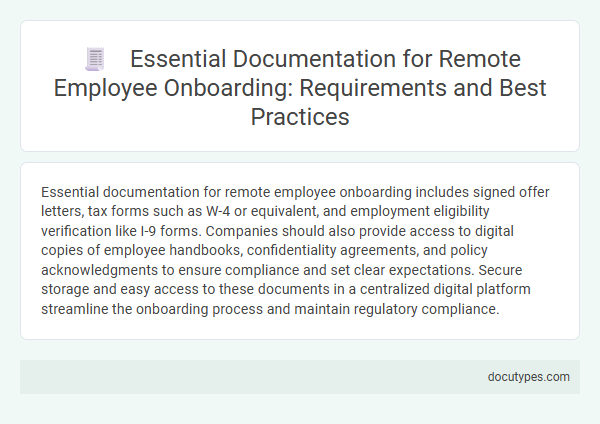Essential documentation for remote employee onboarding includes signed offer letters, tax forms such as W-4 or equivalent, and employment eligibility verification like I-9 forms. Companies should also provide access to digital copies of employee handbooks, confidentiality agreements, and policy acknowledgments to ensure compliance and set clear expectations. Secure storage and easy access to these documents in a centralized digital platform streamline the onboarding process and maintain regulatory compliance.
Introduction to Remote Employee Onboarding Documentation
What types of documentation are necessary for remote employee onboarding? Remote employee onboarding requires comprehensive documentation to ensure smooth integration and compliance. Essential documents include employment contracts, company policies, and technology use agreements.
Key Legal Documents for Remote Employees
Remote employee onboarding requires essential legal documents to ensure compliance with labor laws and protect both the employer and employee. Key documents include the employment contract, which outlines job responsibilities, compensation, and termination terms.
Tax forms such as the W-4 or local equivalents are necessary to establish proper withholding and reporting. Additionally, confidentiality agreements and non-disclosure agreements safeguard proprietary information during remote work.
Digital Identity Verification Requirements
Remote employee onboarding requires specific documentation to ensure legal compliance and secure access. Digital identity verification is essential, including government-issued IDs, biometric data, and secure authentication methods. Your verification process should confirm the employee's identity to protect company data and maintain regulatory standards.
Tax Forms and Payroll Compliance
Tax forms are essential for remote employee onboarding to ensure proper reporting and withholding. Common documents include the W-4 form for federal tax withholding and relevant state tax forms depending on the employee's location.
Payroll compliance requires accurate documentation to meet federal, state, and local regulations. You must collect these tax forms promptly to avoid penalties and to maintain smooth payroll processing for remote employees.
Employment Contracts and Offer Letters
Employment contracts and offer letters are essential documents for remote employee onboarding. These papers establish the terms of employment and clarify expectations for both parties involved.
An employment contract details job responsibilities, compensation, and confidentiality agreements, providing legal protection and clear guidelines. Offer letters serve as formal invitations to join the company, outlining basic job information and start dates. Including these documents ensures a structured and transparent onboarding process for remote employees.
Confidentiality and Data Security Agreements
Confidentiality and data security agreements are essential documents in remote employee onboarding to protect sensitive company information. These agreements outline your responsibilities regarding the handling of proprietary data and set clear guidelines for maintaining privacy. Ensuring that remote employees sign these agreements helps mitigate risks related to data breaches and unauthorized access.
Remote Work Policy Acknowledgements
| Document Type | Description | Importance for Remote Employee Onboarding |
|---|---|---|
| Remote Work Policy Acknowledgement | A formal agreement where the remote employee confirms understanding and acceptance of company remote work guidelines, including communication protocols, work hours, data security, and equipment use. | Essential for setting clear expectations and compliance requirements, ensuring You understand responsibilities and maintain productivity while working remotely. |
| Employment Contract | Document specifying the terms of employment, including role, compensation, benefits, and termination conditions tailored for remote work circumstances. | Establishes legal employment parameters and remote work conditions. |
| Confidentiality and Data Security Agreements | Agreements emphasizing the importance of protecting sensitive information and complying with data protection policies specific to remote environments. | Protects company assets and customer data in remote settings. |
| Equipment and Technology Usage Policy | Outlines proper use and maintenance of company-provided devices and software, covering hardware responsibility and IT support procedures. | Ensures efficient and secure use of technology essential for remote work. |
| Time Tracking and Reporting Guidelines | Instructions on how to log work hours, report time, and attend virtual meetings in alignment with company expectations. | Facilitates accountability and performance monitoring. |
Technology Access and Equipment Checklists
Proper documentation is crucial for efficient remote employee onboarding, especially concerning technology access and equipment. Clear and organized records ensure that new hires are fully equipped to start work without delays.
- Technology Access Authorization - Documents granting permissions for software, VPN, and internal systems ensure secure and seamless remote connectivity.
- Equipment Checklists - Detailed inventories of laptops, peripherals, and accessories verify that all necessary tools are provided and accounted for.
- IT Support Contact Information - Documentation with helpdesk details facilitates prompt assistance and troubleshooting during the onboarding process.
Best Practices for Managing Remote Documentation
Effective management of remote employee onboarding documentation ensures a streamlined and compliant hiring process. Proper documentation supports clear communication and legal adherence for remote teams.
- Employment Contracts - Secure digital signatures on employment agreements to confirm mutual understanding and legal acceptance of job terms.
- Tax and Payroll Forms - Collect and verify necessary tax documents like W-4 or equivalent to facilitate accurate payroll processing and tax compliance.
- Company Policies Acknowledgment - Ensure remote employees review and sign company handbooks and policy documents electronically to confirm awareness and agreement.
What Types of Documentation Are Necessary for Remote Employee Onboarding? Infographic

